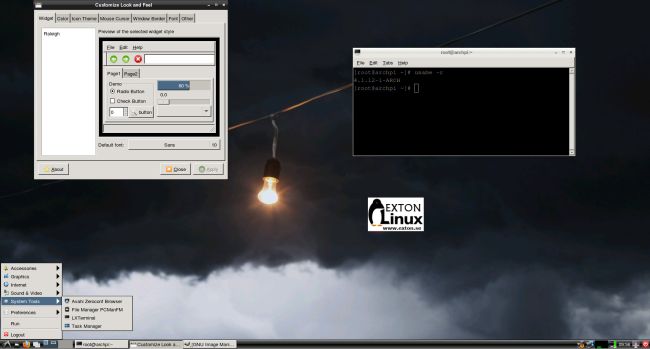 PuppEX Slacko 64 bit is a remaster of Puppy Linux Slacko64 6.3.0, released on November 16, 2015. Kernel 4.3.0-x86_64-puppex is used. Kernel 4.3 is the latest available stable kernel from Kernel.org as of 151130. PuppEX uses the original Puppy Slacko64 Desktop. I have added PCManFM and LXTerminal. They are more useful than ROX-Filer respectively RXVT, I think. The ISO file is on the whole 766 MB, which is due to me including also NVIDIA Graphics driver 352.63, Gimp, Vlc Media Player 2.2.1 installed from source (so you can run it as root), Google Chrome 46.0.2490.86 (for Netflix), Adobe Flash and compiling tools. Puppy Slacko original is of only 234 MB. PuppEX is despite this still running as fast as the original, which means it runs very, very fast compared to most other Linux systems. (Puppy/PuppEX runs from RAM).
PuppEX Slacko 64 bit is a remaster of Puppy Linux Slacko64 6.3.0, released on November 16, 2015. Kernel 4.3.0-x86_64-puppex is used. Kernel 4.3 is the latest available stable kernel from Kernel.org as of 151130. PuppEX uses the original Puppy Slacko64 Desktop. I have added PCManFM and LXTerminal. They are more useful than ROX-Filer respectively RXVT, I think. The ISO file is on the whole 766 MB, which is due to me including also NVIDIA Graphics driver 352.63, Gimp, Vlc Media Player 2.2.1 installed from source (so you can run it as root), Google Chrome 46.0.2490.86 (for Netflix), Adobe Flash and compiling tools. Puppy Slacko original is of only 234 MB. PuppEX is despite this still running as fast as the original, which means it runs very, very fast compared to most other Linux systems. (Puppy/PuppEX runs from RAM).
Compatible with Slackware 14.1
The beauty of Puppy Slacko64 is that programs that are available for Slackware 14.1 also can be easily installed and run in Puppy Slacko64 (and thus also in PuppEX).
MOST IMPORTANT CHANGES
I’ve changed kernel from 4.1.11 to 4.3.0-x86_64-puppex and installed NVIDIA Graphics driver 352.63. The Nvidia driver will be used if your computer/card is “modern” enough. I’ve also added Vlc and Google Chrome (just as I said to make it possible to watch Netflix movies).
Study ALL installed packages in PuppEX
See a screenshot of the Desktop and one when Google Chrome with Netflix is running





